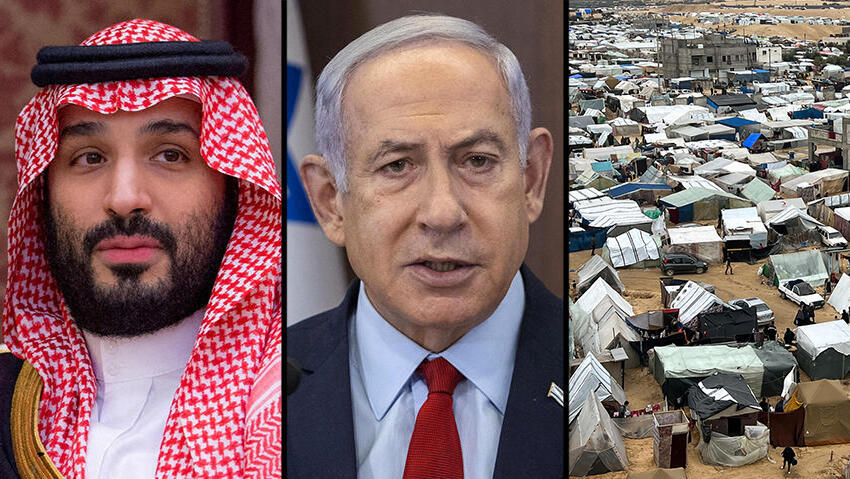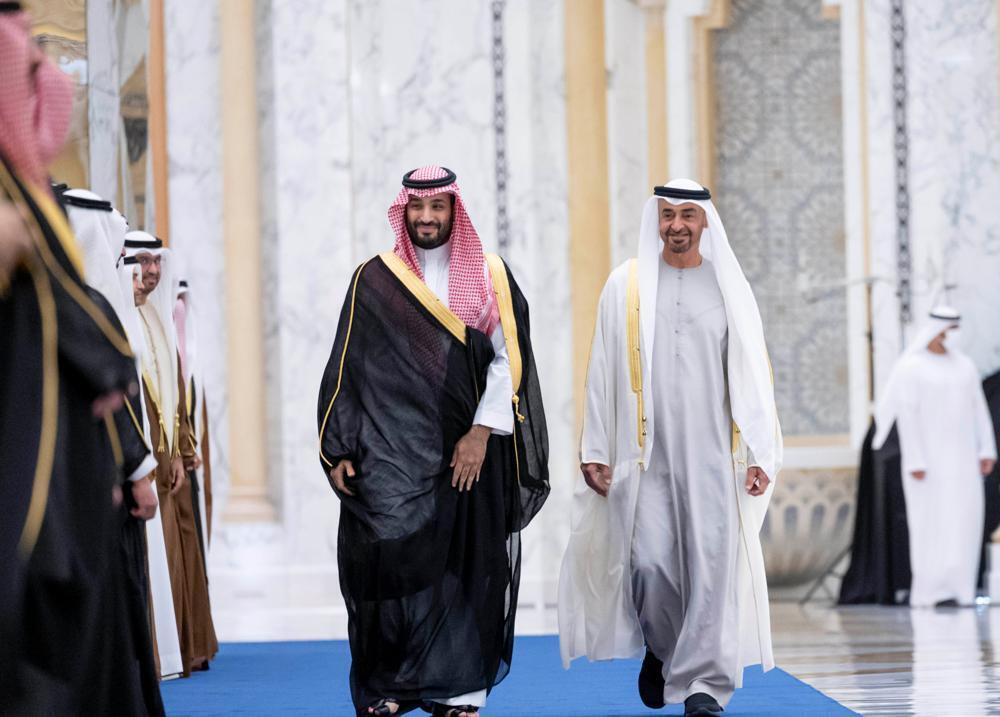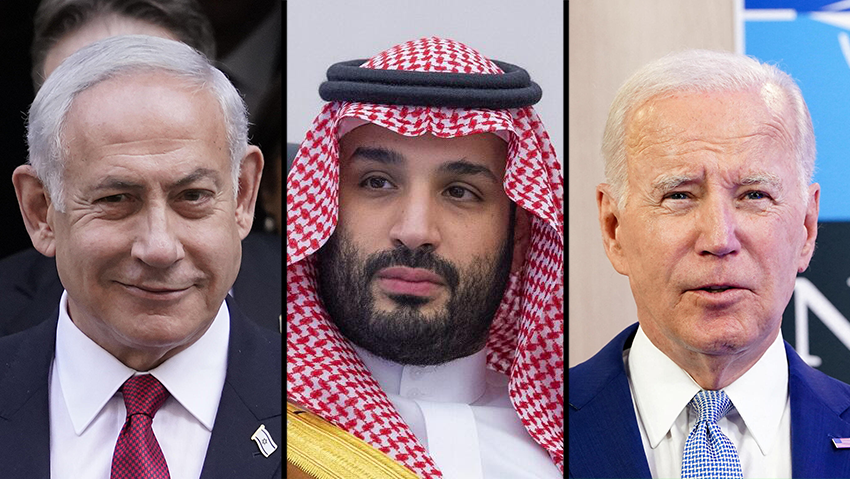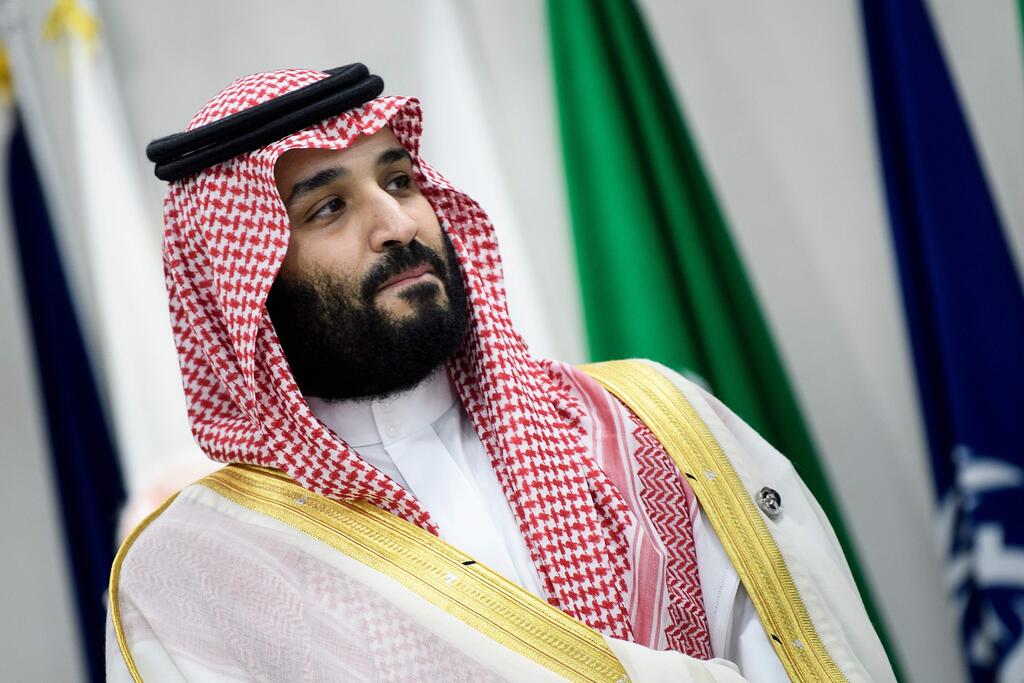Getting your Trinity Audio player ready...
Mohammad S., a Saudi national, recently shared insights from a visit to a family member locked up in a Saudi prison, highlighting a surge in the detainment of political prisoners within the country. The inmate, confined to a section reserved for political detainees, relayed that security personnel are rigorously tasked with surveilling bloggers and detaining those criticizing the Saudi stance on normalizing relations with Israel. This occurs even as top officials in Riyadh publicly endorse the Palestinian cause.
4 View gallery


MBS wants normalization as well as a ceasefire with Hamas
(Photo: REUTERS/Saleh Salem, Amit Shaabi, Bandar Algaloud/Courtesy of Saudi Royal Court/Handout via REUTERS)
Notably, Saudi Arabia, unlike other Arab nations, strictly forbids public demonstrations. Anyone found trying to organize public gatherings is swiftly incarcerated under accusations of betraying the regime.
The position held by Crown Prince Mohammed bin Salman is crucial to understand: he backs the Palestinian Authority headquartered in Ramallah and recently welcomed its leader Mahmoud Abbas. However, his approach to Hamas diverges sharply, with a firm opposition to this and other Islamist groups such as Islamic Jihad in Gaza and Egypt's Muslim Brotherhood.
Bin Salman has explicitly communicated to American and Egyptian leaders that Saudi Arabia will not fund Gaza’s rebuilding efforts. Instead of sending aid like food, medicine, and blankets as other Arab states have done, Saudi Arabia has limited its contribution to a nominal $400 million donation to UNRWA, intended only for the residents.
The exact number of individuals detained in Saudi Arabia for opposing normalization with Israel remains unclear. A Saudi who requested anonymity claimed, "There are at least 400 men detained." He added that numerous women between the ages of 30 and 35 have been cautioned that voicing dissent against the royal family's foreign policies, specifically those concerning the U.S. and Israel, could lead to their immediate arrest.
4 View gallery


Saudi Crown Prince Mohammed bin Salman, left, and Abu Dhabi's powerful crown prince, Sheikh Mohammed bin Zayed Al Nahyan, walk into a reception in Abu Dhabi, United Arab Emirates
(Photo: AP)
Organizations dedicated to human rights and anonymous foreign diplomats have highlighted a recent surge in political arrests in Saudi Arabia, revealed through discussions with local citizens. Saudi authorities defend these detentions as necessary for internal security, citing concerns that protests in support of Hamas and opposing the hardship of Gaza's civilians might stir internal discontent and prompt severe criticism of the Saudi monarchy.
No more "Zionist Entity" references
"Bloomberg," an American news outlet, reported the arrest of a high-ranking executive engaged with the "Vision 2030" initiative, closely overseen by the crown prince and effective leader, Mohammed bin Salman. This executive was detained for posting overly supportive messages about Hamas.
Additionally, a Saudi journalist who declared that "Israel should never be forgiven" was recently imprisoned. "Bloomberg" also notes the arrest of a businessman who advocated boycotting the American fast-food franchise KFC, criticizing the U.S.'s efforts to encourage Saudi normalization with what he termed 'the Zionist entity.'
In a related development, top Saudi officials, led by Mohammed bin Salman, have ceased using the term "the Zionist entity" in reference to Israel. They have instructed media heads and journalists to instead use "the State of Israel" and avoid derogatory terms associated with terrorist groups and certain Islamic leaders, specifically pointing to Shia leaders in Iran, including Supreme Leader Ali Khamenei.
Saudi leadership is openly conducting a series of detentions targeting political dissenters. The rationale behind publicly revealing these arrests, and particularly their grounds, is to send a stern warning to Saudi citizens: avoid crossing paths with bin Salman's diplomatic strategies. Despite maintaining a Saudi ambassador in Tehran, bin Salman is distancing himself from Iran, cautiously reducing ties with China, and decisively aligning with the United States. This alignment presupposes a commitment to move towards normalizing relations with Israel.
4 View gallery


Benjamin Netanyahu, Mohammed bin Salman, Joe Biden
(Photo: Kevin Lamarque / AP, Reuters)
Jane Kinninmont, a specialist in Gulf monarchies and Saudi affairs, conveyed to Bloomberg that Riyadh is genuinely committed to establishing relations with Israel. She noted that Saudis are keen to travel to Israel and are equally enthusiastic about welcoming Israelis to Riyadh, especially as dynamics in the Gaza conflict evolve. Kinninmont stressed that the Saudi government has no interest in being perceived as pro-Palestinian, which starkly contrasts with their geopolitical outlook.
In recent communications, senior Saudi officials clarified that the ongoing conflict in Gaza "has not derailed bin Salman’s broader strategic agenda but has merely delayed its execution."


